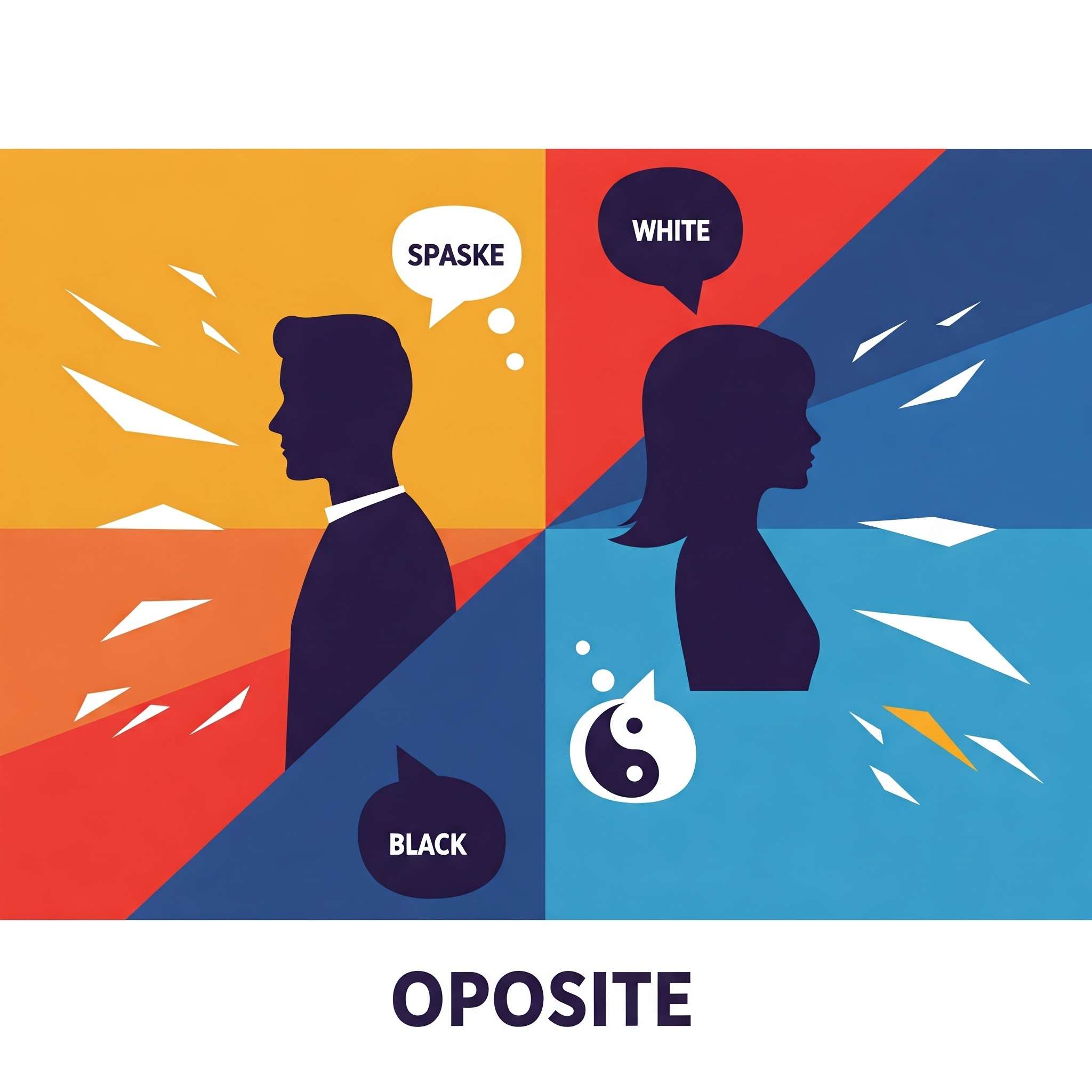Opposite
Definition
The word opposite can function as an adjective, noun, preposition, or adverb. As an adjective, it means situated or placed across from something else or entirely different in nature. As a noun, it refers to something or someone that is the direct contrast of another. As a preposition, it indicates a location directly across. As an adverb, it describes the position of being across from something.
Parts of Speech
- Adjective
- Noun
- Preposition
- Adverb
Pronunciation
American English
- IPA Pronunciation: /ˈɑː.pə.zɪt/
- Respelling: AH-puh-zit
British English
- IPA Pronunciation: /ˈɒp.ə.zɪt/
- Respelling: OP-uh-zit
Etymology
The word "opposite" originates from the Latin "oppositus," meaning "set against" or "contrary," derived from "opponere" (to set against). It entered Middle English through Old French "opposite."
Derivatives
- Opposition (noun)
- Oppositely (adverb)
- Oppositional (adjective)
- Oppositeness (noun)
- Counter-opposite (noun, rare)
Synonyms
- Contrary
- Reverse
- Antithesis
Antonyms
- Same
- Similar
- Equivalent
Usage
The word "opposite" is widely used to describe contrasts, directions, or oppositions. For example, "The two politicians hold opposite views on the issue" or "He lives opposite the park."
Related Terms
- Contrast: The state of being strikingly different.
- Inverse: The opposite in order, position, or effect.
- Opposition: Resistance or dissent.
Detailed Definitions
Adjective
- Placed or situated across from something else: Refers to a location directly facing another.
- Example: "The bookstore is on the opposite side of the street."
- Entirely different in nature or character: Refers to a contrasting quality or condition.
- Example: "Their opinions are completely opposite."
Noun
- Something or someone that is completely different: Refers to a direct contrast or counterpoint.
- Example: "The opposite of love is indifference."
Preposition
- Across from or facing: Indicates a position directly across from something else.
- Example: "He sat opposite her at the table."
Adverb
- In a position facing or across from: Refers to being on the other side.
- Example: "She lives opposite."
opposite



🇨🇳 Mandarin Chinese
- "相反" (opposite)
- IPA Pronunciation: /ɕjaŋ˥˩ fan˥˩/
- Respelling in English: xiāngfǎn
- "对立" (antithesis)
- IPA Pronunciation: /twei˥˩ li˥˩/
- Respelling in English: duìlì
🇮🇳 Hindi
- "विपरीत" (opposite)
- IPA Pronunciation: /ʋɪpəriːt/
- Respelling in English: vipreet
- "उलटा" (reverse)
- IPA Pronunciation: /ʊlʈaː/
- Respelling in English: ulta
🇪🇸 Spanish
- "Opuesto" (opposite)
- IPA Pronunciation: /o'pwesto/
- Respelling in English: opuesto
- "Contrario" (contrary)
- IPA Pronunciation: /kon'trario/
- Respelling in English: contrario
🇫🇷 French
- "Opposé" (opposite)
- IPA Pronunciation: /ɔpoze/
- Respelling in English: opposé
- "Contraire" (contrary)
- IPA Pronunciation: /kɔ̃tʁɛʁ/
- Respelling in English: contraire
🇸🇦 Modern Standard Arabic
- "عكس" (opposite)
- IPA Pronunciation: /ʕaks/
- Respelling in English: 'aks
- "معاكس" (contrary)
- IPA Pronunciation: /mu'akis/
- Respelling in English: mu'akis
🇧🇩 Bengali
- "বিপরীত" (opposite)
- IPA Pronunciation: /biporit/
- Respelling in English: biporit
- "উলটা" (reverse)
- IPA Pronunciation: /ulta/
- Respelling in English: ulta
🇷🇺 Russian
- "Противоположный" (opposite)
- IPA Pronunciation: /prətʲɪvɐˈpoləʂnɨj/
- Respelling in English: protivopolozhnyy
- "Обратный" (reverse)
- IPA Pronunciation: /ɐˈbratnɨj/
- Respelling in English: obratnyy
🇵🇹 Portuguese
- "Oposto" (opposite)
- IPA Pronunciation: /oˈpoʃtu/
- Respelling in English: oposto
- "Contrário" (contrary)
- IPA Pronunciation: /kõˈtɾaɾju/
- Respelling in English: contrário
🇮🇩 Indonesian
- "Berlawanan" (opposite)
- IPA Pronunciation: /bərlawanan/
- Respelling in English: berlawanan
- "Kebalikan" (reverse)
- IPA Pronunciation: /kəbalikan/
- Respelling in English: kebalikan
🇩🇪 German
- "Gegenteil" (opposite)
- IPA Pronunciation: /ɡeːɡn̩taɪ̯l/
- Respelling in English: gegenteil
- "Entgegengesetzt" (contrary)
- IPA Pronunciation: /ɛntˈɡeːɡn̩zɛʦt/
- Respelling in English: entgegengesetzt
🇯🇵 Japanese
- "反対" (opposite)
- IPA Pronunciation: /hantaɪ/
- Respelling in English: hantai
- "逆" (reverse)
- IPA Pronunciation: /ɡjaku/
- Respelling in English: gyaku
🇻🇳 Vietnamese
- "Đối lập" (opposite)
- IPA Pronunciation: /ɗoəi˧ˀ˨ʔ ləːp˧˧/
- Respelling in English: doi lap
- "Ngược lại" (reverse)
- IPA Pronunciation: /ŋwəːk˧ˀ˨ʔ laːj/
- Respelling in English: nguoc lai
🇰🇷 Korean
- "반대" (opposite)
- IPA Pronunciation: /pʰaːnde/
- Respelling in English: bandae
- "반전" (reverse)
- IPA Pronunciation: /pʰaːnt͈ʌn/
- Respelling in English: banjeon
🇹🇷 Turkish
- "Zıt" (opposite)
- IPA Pronunciation: /zɯt/
- Respelling in English: zit
- "Ters" (reverse)
- IPA Pronunciation: /tæɾs/
- Respelling in English: ters
🇵🇰 Urdu
- "مخالف" (opposite)
- IPA Pronunciation: /muxɑːlif/
- Respelling in English: mukhalif
- "الٹا" (reverse)
- IPA Pronunciation: /ʊlʈaː/
- Respelling in English: ulta





